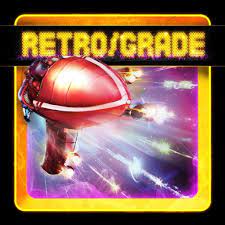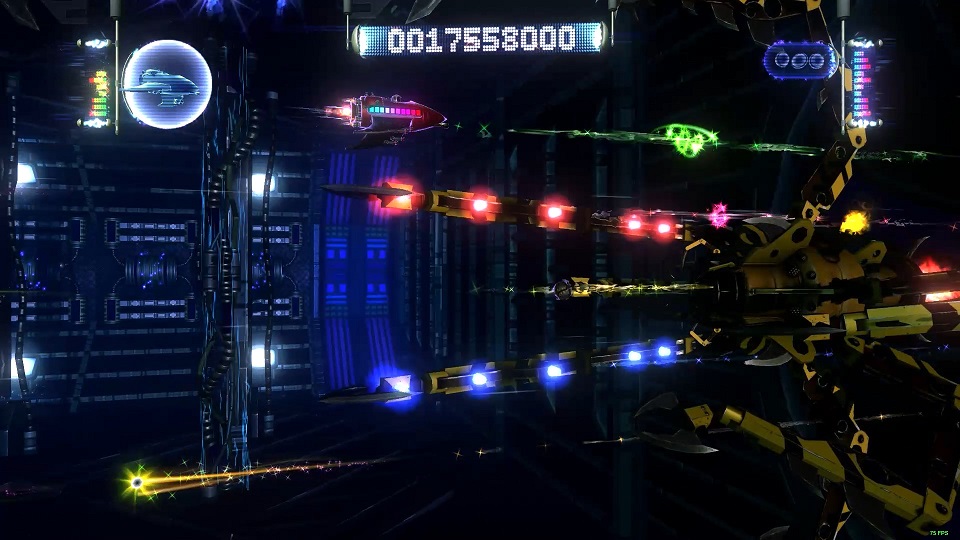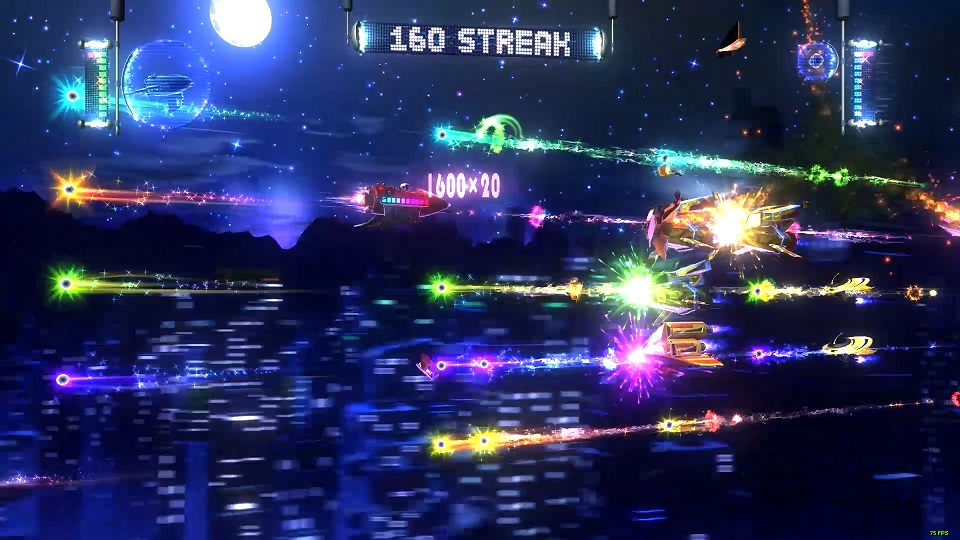Search
[{{{type}}}] {{{reason}}}
{{/data.error.root_cause}}{{{_source.title}}} {{#_source.showPrice}} {{{_source.displayPrice}}} {{/_source.showPrice}}
{{#_source.showLink}} {{/_source.showLink}} {{#_source.showDate}}{{{_source.displayDate}}}
{{/_source.showDate}}{{{_source.description}}}
{{#_source.additionalInfo}}{{#_source.additionalFields}} {{#title}} {{{label}}}: {{{title}}} {{/title}} {{/_source.additionalFields}}
{{/_source.additionalInfo}}Retro/Grade (PC)

Retro/Grade
Developed By: 24 Caret Games
Released: March 21, 2013
Available On: Windows, PS3
Genre: Rhythm, Shoot ‘Em Up
ESRB Rating: E for Everyone
Number of Players: Single-player
Price: $9.99
(Humble Store Link)
24 Caret Games were working on a shoot’em up, as the story goes, and their prototype build had a time-reverse function for debugging purposes. That time-reversal ended up as the seed idea for what would become the rhythm shoot’em up known as Retro/Grade. It was the studio’s only release, and never recouped its costs, and in large part that may have been due to poor timing of its original release on the PlayStation store.
Retrograde motion is an astronomical term for planets appearing to move in reverse, and Retro/Grade is all over this. The game begins at the end of a typical shoot’em up. Rick Rocket has long since defeated the final boss, and now he’s just finishing off the remaining ragtag forces of the Exnorian Armada. Unfortunately for Rick, a temporal anomaly ensues, causing time to play in reverse. Now he has the unenviable job of completely undoing his victory as he flies backwards through time, catching all the bullets he originally shot, and avoiding the enemy shots as he did before. It’s like playing as the inverted soldiers of Christopher Nolan’s TENET, except you don’t need to puzzle out the mind-boggling time shenanigans to enjoy the experience.
Imagine you’ve just recorded a video of yourself playing a shoot’em up. Now play it in reverse speed. Retro/Grade essentially asks that you mimic the movements of what you are now seeing on screen. The game loop is very simple – align yourself in the correct lane, and tap the shoot button when your shot connects with yourself. Later levels add some slight variants to this input. Missile bursts indicate rapid tapping, plasma bursts are un-fired by holding the fire button, and black holes are dodged by holding a movement input. Just like a typical rhythm game, repeatedly landing shots with more precise timing will increase your score multiplier. To really score the big points though, you have a number of Overthrusters which temporarily double all point gains.

Strong Points: Chill beats; gorgeous un-explosions
Weak Points: Repetitive strain injury; only 10 songs
Moral Warnings: Enemy un-explosions
The game does feel a tad short though, with only ten songs at roughly four minutes each. Even if you play through them six times for the six difficulty options, it can certainly get repetitive. Besides replaying the main campaign for a better score, there is an extensive challenges mode where Rick Rocket will play through all ten songs another two dozen times each. Each challenge brings a new twist to the base songs, such as a modified shooting pattern, reversed graphics, or loss of lane coloring. A lot of these changes feel mundane, but they do end up with a larger than expected impact on difficulty as you often have to un-learn or re-learn the associations you made during regular play. Truly sadistic challenges such as “play it perfectly” will test your physical prowess if you are playing Retro/Grade in a longer session – after two hours my left wrist was on fire and burning from the pain of Repetitive Strain Injury. I had to stop for a while there.
For all the relative complexities of the game, the “Retro” in its name well and truly shines through here - these mechanics feel like a natural extension of some 1980s era Game & Watch handheld. But at the end of the day, the game still only has ten songs, and it does get a little repetitive.

Higher is better
(10/10 is perfect)
Game Score - 86%
Gameplay – 15/20
Graphics – 8/10
Sound – 10/10
Stability – 5/5
Controls – 5/5
Morality Score - 94%
Violence – 7/10
Language – 10/10
Sexual Content – 10/10
Occult/Supernatural – 10/10
Cultural/Moral/Ethical – 10/10
The graphics are a colorful neon fever dream, and lean once again into the “Retro” part of the name. Rick’s rocket and the various enemies looks like something out of a 1920s cartoon. Backgrounds are well detailed for a shoot’em up style of game, and all the various windows and screens light up in time with the music. Despite how busy and active the backgrounds are, their colors are still quite muted, allowing all the neon-colored bullets, lasers, and missiles to stand out. The only time it gets hard to see is when the Overdrive is engaged and the bloom is kicked up to ridiculous levels – but that’s not a bad thing here, as it plays right into the aforementioned neon fever dreams.
The “Retro” is also intertwined into the distinct aural identity. Laser shots warble like an old movie with autotune as you un-shoot them. Misfires and damage ping ominously. Naturally though, it’s the soundtrack that takes front and centre stage, and it’s even available to listen to for free. While the game only has ten songs as mentioned, they’re all original tunes, and they all complement each other. Retro/Grade is also perfectly content to deliver chill and relaxing beats, even as it amps up the difficulty. The third track well and truly embodies the “Retro-Grade Groove” that the game creates. I found this to be a very pleasant contrast to the genre standard of doling out “angrier” licensed tunes to match difficulty. Instead of standing in opposition to you, the soundtrack almost asks the player to flow with it; it’s a feeling that players of synaesthetic games like Rez will identify with.
Besides shooting down enemy spacecraft, there are no moral concerns to consider. Retro/Grade is a fascinating time capsule that bottles up the aesthetics and sensibilities of decades long past and manages to create a cohesive game out of it. It’s a short game, but the soundtrack alone is worth the asking price.






